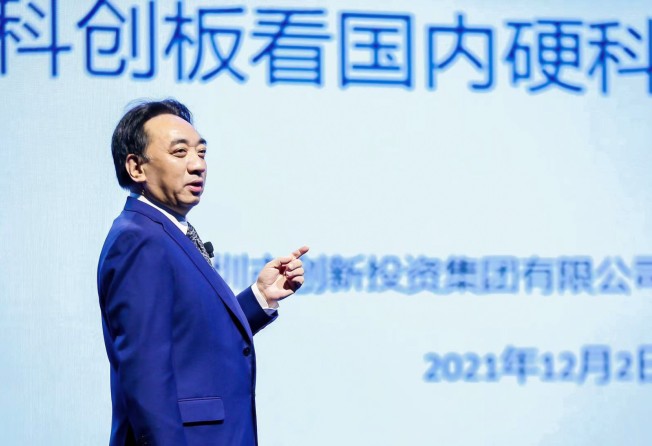
State-backed Shenzhen Capital warns of metaverse, semiconductor overvaluations amid hype in China
- The chairman of Shenzhen Capital Group said overvaluations in the hyped-up metaverse and strategically important semiconductor industries could be harmful
- The metaverse is promising, he said, but the firm has so far avoided investing in virtual reality because it has not lived up to the hype

The flood of money into hyped-up industries involving the metaverse and semiconductors have led to overvaluations that could be harmful in the long run, warns Ni Zewang, chairman of Shenzhen Capital Group, a major government-backed venture capital firm in China.
“We recognise [metaverse] as a future trend and a promising technology, but without an actual application scenario, it won’t be able to create any value,” Ni said during a group interview at the Beyond Expo in Macau on December 2.
“If the bubble expands quickly in a short time, it won’t benefit the technological development of the industry,” he said. “But if the valuation could rise gradually as the technology advances, it would help the companies grow in a healthier way.”

Metaverse, the concept of a shared 3D virtual environment that is considered the next iteration of the internet, has been one of the hottest buzzwords among tech entrepreneurs and investors this year. It got a boost in October when Facebook rebranded itself as Meta. Chinese Big Tech companies have also shown eagerness to embrace the technology.
Conceptually, the metaverse promises a lifelike, immersive virtual world where people can meet, work and play using devices like virtual reality (VR) headsets and smartphones, among other gadgets. However, there is no consensus about what the metaverse actually looks like in practice.
Chinese state media have warned investors against buying into the hype. Last month, Communist Party mouthpiece People’s Daily warned against what it sees as a market frenzy, saying “everyone still needs to stay rational in understanding the current metaverse mania”.
The best timing for investors to move into the field is when the technology is ready to be put to use, Ni said. Shenzhen Capital, he noted, has been cautious about investing in overhyped industries, which helped it avoid the decline of China’s peer-to-peer lending industry.
In hard technology, though, Shenzhen Capital is one of China’s most active investors. Since being established by the Shenzhen government in 1999, it has invested in 1,350 companies with total investments of 75.5 billion yuan (US$11.8 billion), according to the company. More than 200 companies in its portfolio have gone public.
Shenzhen Capital is betting on the metaverse as just one part of a broader trend in the digitisation and intellectualisation of work, according to Ni, who added that the firm is also looking at opportunities in smart manufacturing, health care and new energy.
Hard technology is not immune to overvaluation, though. Ni warned that this has also become an issue in the semiconductor industry, which has attracted a surge in investment amid the global chip shortage. Unreasonably high valuations for start-ups could drive investors away from participating in later-stage funding, Ni said.
In China, interest in the chip industry has been invigorated by subsidies and favourable policies, as Beijing pushes for technological self-sufficiency amid US sanctions that have cut off some domestic companies from advanced chips and related technologies. The industry continues to rely heavily on imported chips.
The number of newly registered chip-related companies in China more than tripled from January through May compared with the same period last year, according to corporate information platform Qichacha.
One chip firm to recently attract investment from Shenzhen Capital is Moore Threads, a Beijing-based research and development firm focusing on graphics processing units (GPUs), a market dominated by US firm Nvidia. Barely a year old, the company has already reached unicorn status with a valuation of more than US$2 billion. Sequoia Capital China and GGV Capital also invested in the chip designer.
Shenzhen Capital is prioritising chip companies that have already received orders from major tech companies or at least have products ready to be sent to manufacturers, Ni said.
He also acknowledged that geopolitical tensions have accelerated the pace of chip investment. Chinese companies are increasingly relying on domestic chip firms amid uncertainty around access to US technology, Ni said.
“Four or five years ago we wouldn’t have had many opportunities to invest in semiconductors, because domestic companies could not find many clients that are willing to use their products,” Ni said. “Now the challenges will push the core sector to move forward, even though it will face pressure in the short term.”